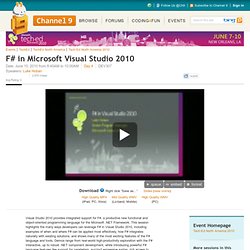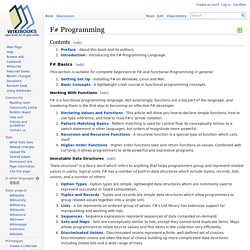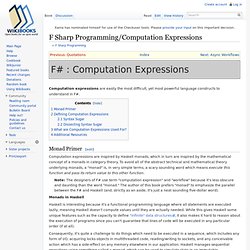

F# in Microsoft Visual Studio 2010. Visual Studio 2010 provides integrated support for F#, a productive new functional and object-oriented programming language for the Microsoft .NET Framework.

This session highlights the many ways developers can leverage F# in Visual Studio 2010, including examples of when and where F# can be applied most effectively, how F# integrates naturally with existing solutions, and shows many of the most exciting features of the F# language and tools. Demos range from real-world high-productivity exploration with the F# Interactive, up to robust .NET component development, while introducing powerful F# language features like support for parallelism, succinct expressive syntax, rich access to .NET, and the more declarative functional style of programming in F#. For more information, check out this course on Microsoft Virtual Academy: Visual Studio. Try F#: Tutorials. F# Programming. Contents[edit] Preface - About this book and its authors.Introduction - Introducing the F# Programming Language.

F# Basics[edit] This section is suitable for complete beginners to F# and Functional Programming in general. Getting Set Up - Installing F# on Windows, Linux and Mac.Basic Concepts - A lightweight crash course in functional programming concepts. F Sharp Programming/Computation Expressions. Computation expressions are easily the most difficult, yet most powerful language constructs to understand in F#.

Monad Primer[edit] Computation expressions are inspired by Haskell monads, which in turn are inspired by the mathematical concept of a monads in category theory. To avoid all of the abstract technical and mathematical theory underlying monads, a "monad" is, in very simple terms, a scary sounding word which means execute this function and pass its return value to this other function. Note: The designers of F# use term "computation expression" and "workflow" because it's less obscure and daunting than the word "monad. " The author of this book prefers "monad" to emphasize the parallel between the F# and Haskell (and, strictly as an aside, it's just a neat sounding five-dollar word).